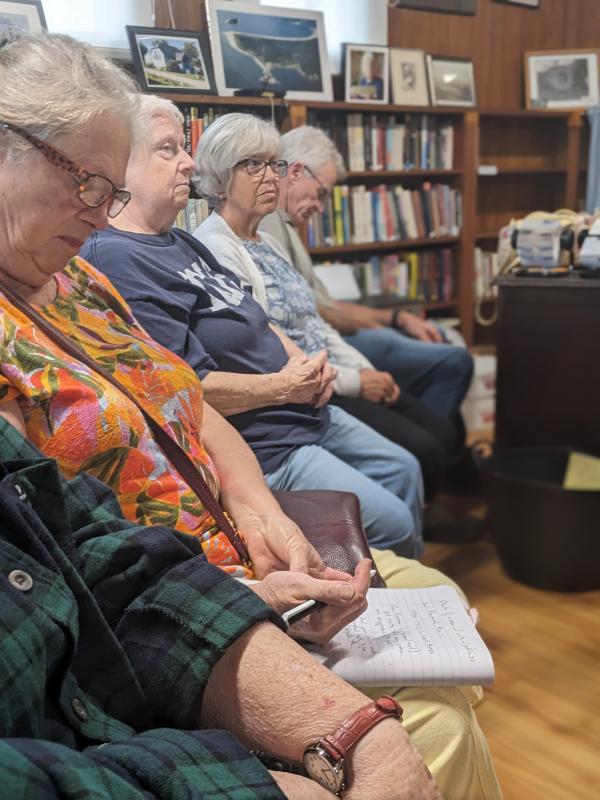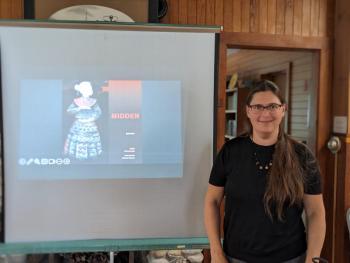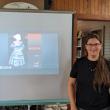Maine Poet Laureate honors Malaga Islanders
 Maine Poet Laureate Julia Bouwsma presents “Midden,” a collection of poems about Malaga Island history, at Popham Beach Library. CANDI JONETH/Boothbay Register
Maine Poet Laureate Julia Bouwsma presents “Midden,” a collection of poems about Malaga Island history, at Popham Beach Library. CANDI JONETH/Boothbay Register
 CANDI JONETH/Boothbay Register
CANDI JONETH/Boothbay Register
 CANDI JONETH/Boothbay Register
CANDI JONETH/Boothbay Register
 CANDI JONETH/Boothbay Register
CANDI JONETH/Boothbay Register
 CANDI JONETH/Boothbay Register
CANDI JONETH/Boothbay Register
 CANDI JONETH/Boothbay Register
CANDI JONETH/Boothbay Register
 CANDI JONETH/Boothbay Register
CANDI JONETH/Boothbay Register
 Maine Poet Laureate Julia Bouwsma presents “Midden,” a collection of poems about Malaga Island history, at Popham Beach Library. CANDI JONETH/Boothbay Register
Maine Poet Laureate Julia Bouwsma presents “Midden,” a collection of poems about Malaga Island history, at Popham Beach Library. CANDI JONETH/Boothbay Register
 CANDI JONETH/Boothbay Register
CANDI JONETH/Boothbay Register
 CANDI JONETH/Boothbay Register
CANDI JONETH/Boothbay Register
 CANDI JONETH/Boothbay Register
CANDI JONETH/Boothbay Register
 CANDI JONETH/Boothbay Register
CANDI JONETH/Boothbay Register
 CANDI JONETH/Boothbay Register
CANDI JONETH/Boothbay Register
 CANDI JONETH/Boothbay Register
CANDI JONETH/Boothbay Register
The historic 1910 Popham Beach Library, nine miles from Malaga Island, provided the perfect backdrop for “Our Arms Spread Out Around It All, A History of Malaga Island through Poems,” with Maine Poet Laureate Julia Bouwsma. The event took place Aug. 20 as part of Maine Humanities Council’s (MHC) sponsored Maine Speaks Series. About a dozen people gathered to hear Bouwsma recite 10 poems while describing the internality and self-examination required to tell the appalling stories of Malaga Island’s forcibly displaced, some incarcerated, some involuntarily committed, interracial residents.
Central to the talk was her award-winning book, “Midden” (Fordham University Press, 2018), a collection of poems written in the personas of the characters as they each played their role in the Island’s history. Bouwsma gave soulful voice to the citizens as they were driven from their homes, and disturbing nonchalance to the governmental officials overseeing the erasure of the colony. “It was just math,” a chilling last line in one poem, drew signs of discomfort from the crowd.
“Midden” was written over 10 years between 2008 and 2018. Bouwsma’s research was extensive, with citations ranging from books such as Steve Mitchell’s “The Shame of Maine” (1999), to the “Fragmented Lives” exhibit at Maine State Museum. She looked at hundreds of old newspaper articles, letters and binders full of personal correspondence. She pasted photos, articles, poems and lists on her office wall to help her feel completely immersed in the project, and when she met Daniel Minter and saw an image he had created of a woman cradling her arms around nothing – representing the sense of loss and absence, she knew she had found the perfect book cover.
Bouwsma, a homesteader with deep ties to her home, would separate herself from her property for months in order to feel the same loss of connection to home the islanders endured. “It was not scholarly research,” she said. “I had to discover what I didn’t know, what I had never known, and why I didn’t know it. It was a poet’s research.” It also raised questions for her about her own ancestry. Being of European Jewish descent, she realized there was a lot she’d never know – the patterns of silence passed from one generation to the next, she called them. She does not know her great-grandmother’s real name. Parallels of Bouwsma’s family history and the atrocity of Malaga Island’s evictions, which were followed by a century of socially enforced silence, are apparent. As Mainers work to understand what happened at Malaga Island, Bouwsma draws upon her own lost history, to bridge the past to the present and remind us of the relevancy of this history to our current moment in time.
Bouwsma’s skill as a poet, employing varying crafts and techniques, is on full display in “Midden.” The first poem she wrote for the book, “The Story of Fire,” is a list poem of items left behind. It was written after a Maine Coast Heritage Trust-sponsored trip to the island during the time of archeological digs. Any homes that weren’t dismantled and shipped ashore were burned down. Bouwsma includes erasure forms and spoke of one sestina format that didn’t quite fit with the rest of the poems.
Bouwsma sees “poetry as the antidote for isolation and polarization plaguing us.” Her approach to the work was well-considered. “I had to find balance: Pointing out the problem without being part of the problem is a thin line to walk. Engaging history through language requires responsibility. I had to ask myself, could I write about Malaga responsibly and in a way that honors people? It was important to me to get it right.” She went on to say, “Poetry is well suited for dealing with painful, messy things. It’s why I wrote this book.”
“Poetry is a powerful tool for connection and understanding. The process of reading poetry together connects us. And, while our interpretations and understandings of what we read may differ from our neighbors, we come to understand more about each other through sharing how the poem moves and impacts us,” wrote MHC’s executive director Samaa Abdurraqib in an email to the Register. “Our Maine Speaks program brings Maine writers, scholars, and activists to communities across the state, giving all Mainers an opportunity to learn more about past and present people and events that shape this place we call home.”
Bouwsma is the sixth Maine Poet Laureate (2021-2026). She is the author of two poetry collections and the recipient of the Maine Literary Awards in 2018 and 2019. She won the 2016-17 Poets Out Loud Prize, and the 2015 Cider Press Review Book Award and has received other fellowships and residencies. She wrote and recited an original poem, “This Home We Carry” for the second inauguration of Gov. Janet Mills and has included a poem in the state's Bicentennial Time Capsule, which won’t be opened for 100 years. Her work as Poet Laureate has taken her all over the state, bringing awareness to the art. She has taught poetry workshops to prison inmates. She hopes to visit all 250-plus Maine libraries.
On Aug. 6, Bouwsma was one of 22 poet laureates awarded a $50,000 grant from The Academy of American Poets for her proposed epistolary poetry project, a statewide, multi-phase project that uses poetry in the form of exchanged letters to foster communication and connection across a rural state. The project will kick off with public workshops in each county and virtual options in October. Over winter, invitations for signing up to be pen pals will go out and, in the spring, a call for completed work will be sent. The project will culminate with celebrations featuring readings, panels and performances. She hopes an anthology of the project will be published.


































